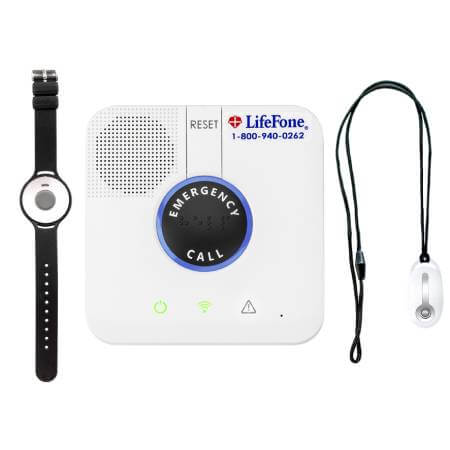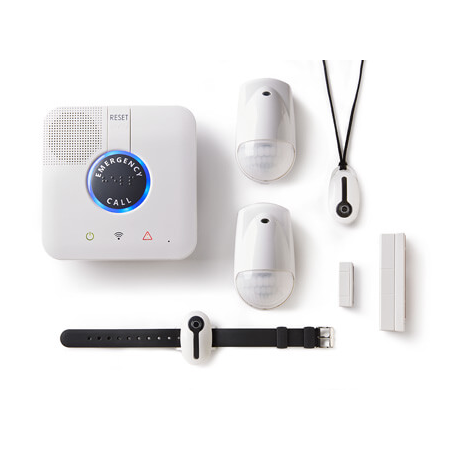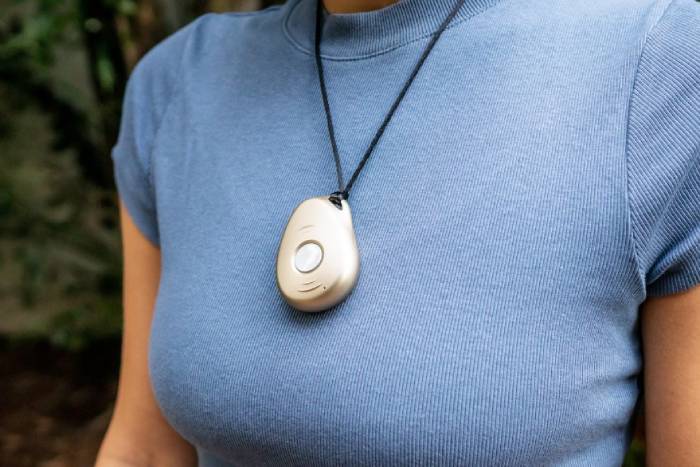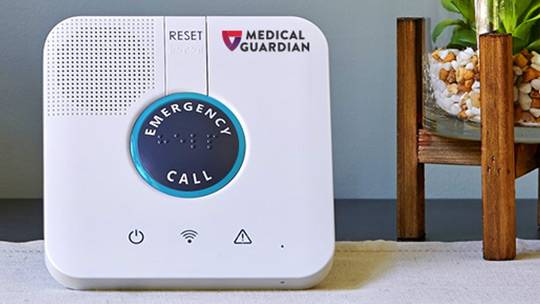LifeFone vs Medical Guardian
Medical alert systems are crucial devices designed to provide emergency assistance to individuals, particularly the elderly or those with certain medical conditions. These systems work by sending alerts to a monitoring center when the user presses a help button or when an automatic feature, such as fall detection, is triggered. The monitoring center then dispatches emergency services as needed.


4.7
Starts at $24.95
LifeFone


5.0
Starts at $0.97 per day
Medical Guardian
Brio House is an independent review site. We may earn money when you click links inside our site.
Medical alert systems are crucial devices designed to provide emergency assistance to individuals, particularly the elderly or those with certain medical conditions. These systems work by sending alerts to a monitoring center when the user presses a help button or when an automatic feature, such as fall detection, is triggered. The monitoring center then dispatches emergency services as needed.
These systems come in various forms, including in-home systems, mobile units, and wearable devices. Some systems are designed for use at home, while others are equipped with GPS tracking for use on the go. The choice of system depends on the user’s lifestyle and specific needs.
Importance of Comparing Medical Alert Systems
Comparing medical alert systems is crucial to ensure that you or your loved ones get the best possible care and assistance. Each system has its unique features, costs, and user experiences, and what works best for one person might not be the best fit for another.
When comparing the best medical alert systems, it’s important to consider the features that are most relevant to the user’s needs. These may include emergency services, fall detection, monitoring center quality, battery life, and on-the-go GPS capabilities.
Cost is another important factor. This includes not only the upfront cost of the equipment but also any activation fees, monthly monitoring fees, and whether you can pay quarterly or must pay all at once.
Finally, user experience is key. This can include everything from the ease of setup and use to the quality of customer service. Reviews from Medical Guardian users and LifeFone users can provide valuable insights into what you can expect from each service.
By comparing medical alert systems, you can ensure that you choose a system that offers the best balance of features, cost, and user experience for your specific needs and lifestyle.
When choosing a medical alert system, you need to make three key decisions that will affect the overall functionality of your system and how much you’ll pay:
- Do You Want a Home-Based or Mobile System? Originally, medical alert systems were designed to work inside your home with your landline telephone. Many companies now also offer the option of home-based systems that work over a cellular network for those who might not have a landline. But many companies offer mobile options, too. These systems operate over cellular networks and incorporate GPS technology. This way, if you get lost or press the call button for help but are unable to talk, the monitoring service can find you.
- Should Your System Be Monitored or Not? The systems are all monitored, meaning that the call button connects you with someone at a 24/7 dispatching center. But you have the option to choose a system that isn’t monitored. With these, when you press the call button, the device automatically dials a friend or family member on your programmed emergency call list. These products can often be set up to call multiple people and to contact emergency services if you don’t get an answer from someone on your list.
- Should You Add a Fall-Detection Feature? Some companies offer the option of automatic fall detection for an additional monthly fee. Manufacturers say these devices sense falls when they occur and automatically contact the dispatch center, just as they would if you had pressed the call button. However, this feature might not work perfectly every time, and in some cases, it may register something as a fall that isn’t.
By considering these factors and comparing different best medical alert systems, you can make an informed decision that best meets your needs.
Overview of LifeFone and Medical Guardian


LifeFone and Medical Guardian are two of the leading medical alert system companies offering a wide range of reliable devices and services. Both companies offer 24/7 monitoring and the ability to contact emergency services, including the police, fire department, EMTs, or even family members, depending on the type of emergency.
LifeFone

LifeFone has been providing peace of mind for seniors since 1976. It offers options for in-home use as well as on-the-go with GPS-enabled systems. LifeFone does not require a contract, and a subscription can be canceled at any time. LifeFone also provides a Subscriber Price Guarantee, meaning that once you subscribe, you’ll never have to worry about the company upping the price.
LifeFone devices come with a Lifetime Warranty and a 30-day money-back guarantee. Free spouse monitoring is available with LifeFone plans, and fall detection can be added for an extra $5-$10 a month.
Features and Services
- LifeFone offers a range of device options, including the standard at-home landline device and an at-home cellular device, along with several on-the-go options for those looking to continue leading an active lifestyle.
- Each device features summoning capabilities, in which the user can press a small button and alert LifeFone to an emergency.
- Optional fall detection technology calls for help automatically in the event of a fall, connecting users with personnel at LifeFone monitoring stations.
- LifeFone uses existing Verizon and AT&T 4G LTE networks close to users’ homes for emergency response communication. The company uses its own cellular service, so you’re not required to have a phone plan for use. GPS and Wi-Fi technology are then used to determine user location.
Costs
- LifeFone’s At-Home and On-the-Go VPX monthly monitoring plan can cost as little as $41.95 a month.
- There’s no installation fee for LifeFone At-Home and On-the-Go VPX devices, and if purchasing an annual or quarterly LifeFone subscription, the shipping and handling fee is waived.
- Those who purchase annual or quarterly subscriptions will also receive one free month of service, according to the company.
- Additional fees may include fall detection and insurance, both of which cost $5 per month and are optional. Both services can be added at any time after a subscription is purchased.
User Experience
- LifeFone has an A+ rating from Better Business Bureau (BBB) and a rating of 4.7 out of 5 stars on Trustpilot.
- Customers on Trustpilot note the company’s fast response time, ease of setup, and modest pricing options in comparison to other medical alert systems.
- However, two customers noted poor customer service experiences.
Medical Guardian

Medical Guardian was founded in 2005 and offers a wide range of products. Like LifeFone, Medical Guardian does not require prospective buyers to sign long-term contracts. Devices come with access to the MyGuardian portal, which allows users to track shipments, manage their accounts, and access manuals electronically.
Medical Guardian’s monitoring center is TMA Five-Diamond Certified, and highly trained operators will notify EMTs, the fire department, or a loved one depending on the kind of emergency. Operating nationwide (also available in Puerto Rico and Canada), Medical Guardian has a variety of systems for individuals looking for protection at and around their homes, as well as on the go with GPS technology.
Features and Services
- Medical Guardian offers five main products as well as a caregiver app that family members can use to stay in the loop with their loved one’s activities at home.
- The MGMove is a smartwatch that is cellular-based and uses 2-way communication capabilities so that the user can speak with responders without a phone.
- The Mini Guardian is a discrete approach to the traditional wireless pendant that is a self-contained, cellular-based unit with two-way talk built right into the small device.
- Medical Guardian has fall detection options with all of its products except the MGMove smartwatch. A great asset in case of an emergency that renders you unconscious or unable to press the button yourself.
Costs
- Medical Guardian’s monthly pricing begins at $29.95. This fee covers services, including 24-hour technical and customer support as well as monitoring and emergency response.
- Although some of the equipment can be free, users who choose the MGMove or Mini Guardian will need to pay for that equipment. Shipping fees are approximately $12.50 but are waived if the user chooses an annual payment.
User Experience
- Medical Guardian prides itself on its A+ rating with the Better Business Bureau.
- Medical Guardian gets a 4.5 out of 5 stars from Medical Alert Advice and is considered a solid choice.
- It is a great affordable option for you or your loved one. If you are interested in purchasing Medical Guardian, feel free to check out their current special offers!
comparing lifefone vs Medical Guardian
| Company | Device Variety | Fall Detection | Emergency Services | GPS | Pricing | User Experience |
|---|---|---|---|---|---|---|
 |
View Packages | Yes | Yes | Yes | Starts at $24.95/month | Daily check-in calls |
 |
View Packages | Yes | Yes | Yes | Starts at $0.97 per day | Stylish smartwatch-style device |
Comparison of Features
Emergency Services
Both Medical Guardian and LifeFone provide 24/7 monitoring through their range of reliable devices. They offer the ability to contact the police, fire department, EMTs, or family members, depending on the type of emergency.
Fall Detection
Medical Guardian and LifeFone offer optional fall detection for an added monthly fee. This technology is crucial as falling while at or around the home is a major cause of injury in seniors. The fall detection technology will notify the proper first responders if a fall is detected, even if the individual is not able to physically press the appropriate button on their device.
Monitoring Center
Both companies operate nationwide and have TMA Five-Diamond Certified monitoring centers. Highly trained operators at these centers will notify EMTs, the fire department, or a loved one depending on the kind of emergency.
Battery Life
Both Medical Guardian and LifeFone have in-home backup battery life of 32 hours. However, for on-the-go devices, Medical Guardian’s Active Guardian system has an impressive five-day battery life, while LifeFone’s At-Home & On-The-Go GPS, Voice-In Pendant offers 30 days of battery life.
On the Go GPS
Both Medical Guardian and LifeFone offer the option for a medical alert with GPS for added safety while away from home. This feature is particularly useful for active seniors who spend a lot of time out and about.
Comparison of Costs
Equipment Fees
Medical Guardian offers free equipment for most systems, but charges $125.45 for Mini Guardian and $299.95 for MGMove. On the other hand, LifeFone includes equipment costs in subscription fees.
Activation Fee
Both Medical Guardian and LifeFone do not charge an activation fee, making it easy for seniors and their loved ones to start using their services.
Monthly Monitoring
Medical Guardian’s monthly price range is from $29.95 to $44.95, while LifeFone’s is from $24.95 to $48.95.
Pay Quarterly
LifeFone allows users to pay a slightly lower monthly price if they pay quarterly and annually, whereas Medical Guardian only offers lower rates if users sign up for an annual plan.
GPS System
Both Medical Guardian and LifeFone include GPS in their on-the-go systems. This feature is particularly useful for active seniors who spend a lot of time out and about.
Comparison of User Experience
Medical Guardian Users
Medical Guardian shines for its stylish smartwatch-style device and its two plans that come with caregiver apps with activity tracking. It offers a wide range of options, fitting the lifestyle needs of most seniors whether they are looking for protection at or away from home. They also offer a smartwatch option that many other Medical Alert System companies do not.
LifeFone Users
LifeFone excels for its pricing, its inexpensive standalone mobile app and add-on services, such as daily check-in calls and an activity assurance system. It is unusual in the medical alert system industry in that it offers a standalone emergency mobile app that allows device users and non-device users to contact the company’s emergency monitoring system from their smartphones.
Conclusion: LifeFone vs Medical Guardian
When it comes to choosing the best medical alert system between LifeFone and Medical Guardian, the decision largely depends on individual needs and preferences. Both companies offer a wide range of services, including the ability to contact the police, fire department, EMTs, or family members, depending on the type of emergency. They also offer 24/7 nationwide coverage with no risks of getting locked into a long-term contract.
Medical Guardian excels in providing more advanced features and a wider variety of options, including their MGMove watch and Active Guardian system, which has an impressive seven-day battery life. However, their prices start a bit higher, with their most affordable system costing $29.95 per month.
On the other hand, LifeFone offers comparably simple in-home and mobile systems with prices starting at just $24.95/month. They also provide a Subscriber Price Guarantee, meaning that once you subscribe, you’ll never have to worry about the company upping the price.
In terms of other medical alert systems, there are many alternatives in the market. However, the choice should be based on individual needs, budget, and the specific features that one is looking for in a medical alert system.
FAQs
What is the difference between LifeFone and Medical Guardian?
LifeFone and Medical Guardian are both reputable medical alert system companies, but they differ in terms of their offerings and pricing. Medical Guardian provides more advanced features and a wider variety of options, but their prices are slightly higher. LifeFone, on the other hand, offers simpler in-home and mobile systems at a lower starting price.
Which medical alert system is more affordable, LifeFone or Medical Guardian?
LifeFone is more affordable with prices starting at just $24.95/month. However, it’s important to consider the features and services each company offers when comparing costs.
Which medical alert system offers better features, LifeFone or Medical Guardian?
Medical Guardian offers more advanced features and a wider variety of options, including their MGMove watch and Active Guardian system. However, LifeFone also provides a comprehensive range of services and features, including fall detection and GPS-enabled systems.
What are the alternatives to LifeFone and Medical Guardian?
There are many alternatives to LifeFone and Medical Guardian in the market. Some of these include Bay Alarm Medical, MobileHelp, and Philips Lifeline. However, the choice of a medical alert system should be based on individual needs, budget, and the specific features that one is looking for in a system.
